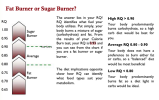I read through this thread just now and see people arguing about laws of physics, calorie-in-calorie-out (CICO) and more. This is an example of disagreement between people using terms differently due to their background, there is also a bit of what I call "violent agreement", where people argue, but actually agree. As I am a scientist, I've decided to add my thoughts.
1) The laws of physics and thermodynamics are universal, and valid also for T2s. Energy is conserved and cannot be made out of nothing nor disappear. Anyone pretending otherwise is trying to sell you snake oil. Our bodies need energy, say about 2000 calories per day (your mileage may vary) where 1 food calorie is defined as the amount of heat needed to raise
the temperature of one litre of water by one degree Celsius and amounts to 1 kcal = 4.184 Joules (1 Joule is the unit of energy).
2) From energy conservation it follows that to lose weight, one has consume fewer calories than one is using.
3) Our bodies expend energy by breathing, I've explained this in the following thread,
https://www.diabetes.co.uk/forum/threads/when-you-lose-weight-where-does-the-fat-go.182000/ after I was surprised to learn that a majority of doctors, dieticians and fitness trainers have this wrong.
4) CICO is not a good model for the human body, because it is much too simplistic. Our bodies are not combustion engines. The body treats calories from protein, fat and carbohydrates differently, our hunger is regulated by hormones, such as insulin. So statements such as fatty food are more satiating or carbs are all converted into glucose and excess is turned into body fat are mostly correct.
5) The body has a metabolic base rate, which is what is the minimum you need before any activity. When you diet by only reducing your calorie intake to say 1500 cals you will lose weight, but at some point your metabolic base rate reduces as well and at after a some time you will stop losing (or event re-start gaining) weight. Importantly you will always feel hungry (recall you are a hormonal machine) and become miserable and eventually stop. Thus in my honest view such diets are almost impossible to sustain. We all know or have been yo-yo dieters, which do this over and over.
6) Reducing carbs, and compensating by more fat (LCHF) has been used successfully by many to lose weight sustainably, as the change in diet and increase for fat reduces feeling hungry.
7) Another dietary approach that seems to work well for many (including yours truly) is intermittent fasting. By restricting (or removing) calories for limited time periods, the metabolic base rate will not reduce and you can lose weight
8) You might have noted that I have not said anything about blood sugar, which is increased in T2 who cannot properly deal with carbs. Many on this forum have reduced their HbA1c into remission by switching to a LCHF diet, and you immediately realise that this makes sense. Fewer carbs leads to less hunger and carb craving and thus lower blood sugar values. People argue about what comes first, the lowering of the HbA1c by LCHF or losing weight. I don't think we should argue about this, it is more important to acknowledge that LCHF will help you in both goals.


